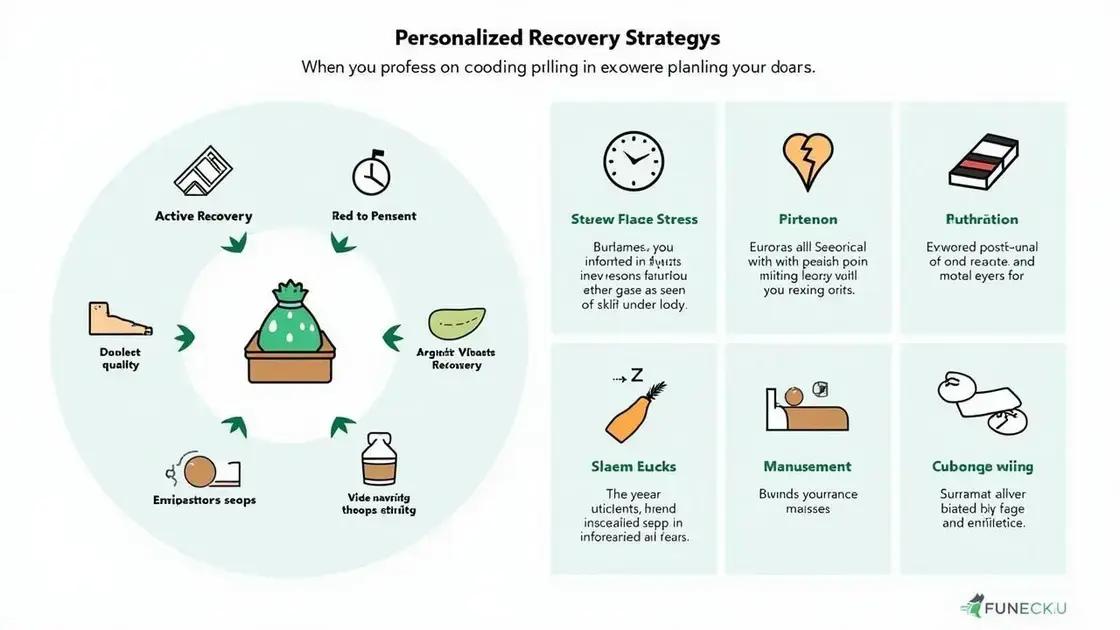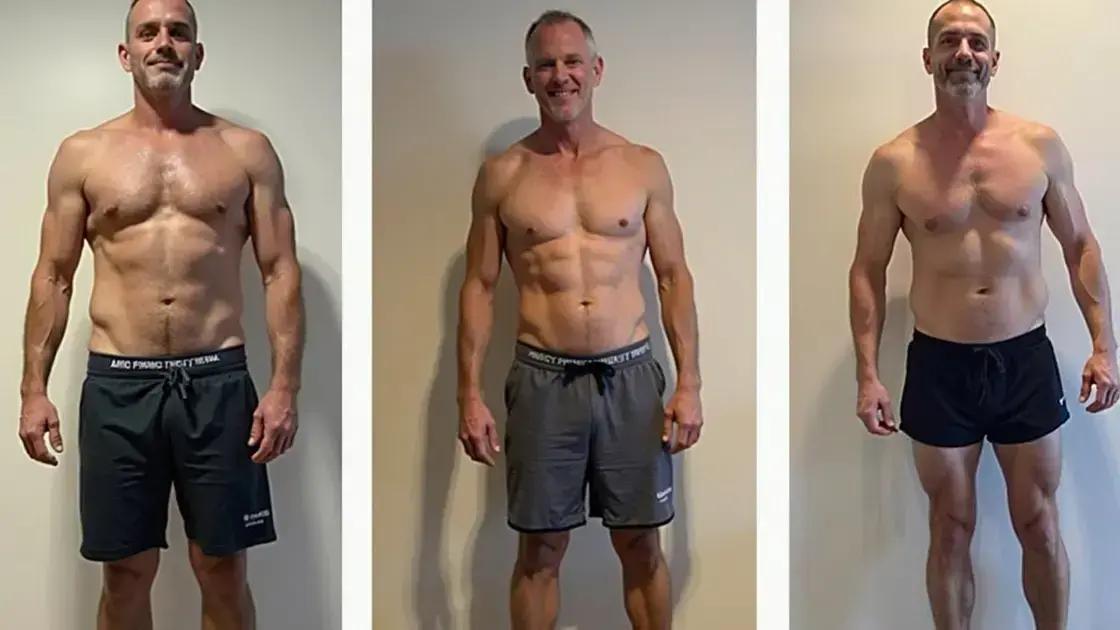How personalized recovery strategies are trending in men’s fitness routines involves tailored methods that enhance recovery, improve performance, and prevent injuries through active recovery, nutrition, hydration, and adequate rest.
In recent years, the way men approach fitness recovery has evolved dramatically. How personalized recovery strategies are trending in men’s fitness routines is more than just a buzzphrase; it represents a significant shift toward customized wellness practices that enhance physical performance and mental well-being. By embracing tailored recovery methods, men can not only improve their workout results but also foster a healthier lifestyle overall. This article will delve into the essentials of personalized recovery, its benefits, strategies to incorporate into your routine, and inspiring success stories from those who have embraced this modern approach.
Understanding Personalized Recovery

Understanding personalized recovery is essential for optimizing fitness routines. Personalized recovery focuses on tailored strategies that cater to an individual’s unique needs, helping them recover more effectively from workouts. This approach considers various factors like age, fitness level, dietary habits, and even personal preferences. By recognizing these key aspects, men can enhance their performance and minimize the risk of injury.
The Importance of Recovery
Recovery is as crucial as exercise itself. During physical activity, muscles undergo stress and tiny tears. Effective recovery helps repair these muscles, replenishing energy stores and ensuring that the body is ready for the next workout. Ignoring recovery can lead to fatigue, decreased performance, and increased injury risk.
Elements of Personalized Recovery
Several elements contribute to a successful personalized recovery strategy, including:
- Active Recovery: Engaging in light activities such as walking or yoga can promote blood flow and reduce soreness.
- Nutritional Support: Consuming the right nutrients helps in muscle repair and provides the necessary energy for recovery.
- Sleep Quality: Adequate sleep is vital for physical recovery and overall well-being. Aim for 7-9 hours of quality sleep per night.
- Stress Management: Mental recovery is as important as physical recovery. Techniques such as meditation or deep breathing can reduce stress, improving recovery time.
By incorporating these elements into their routines, men can create a personalized recovery plan that effectively supports their fitness goals.
Key Benefits for Men’s Fitness

Implementing personalized recovery strategies offers numerous benefits for men’s fitness. These advantages help improve overall performance and well-being. Here are some key benefits:
Enhanced Muscle Recovery
Personalized recovery focuses on individual needs, leading to better muscle recovery. Tailored strategies help repair muscle damage and reduce soreness, allowing men to bounce back faster.
Increased Performance
When recovery is optimized, performance improve significantly. Proper rest and nutrition enable men to train harder and longer while minimizing fatigue.
Injury Prevention
By understanding personal limits and customizing recovery strategies, men can significantly decrease the risk of injuries. Personalized plans address specific weaknesses and enhance overall resilience.
Improved Mental Health
Recovery isn’t just about the body; it’s also about the mind. Integrating relaxation techniques, such as meditation, allows men to manage stress better, improving their focus and motivation.
In summary, the benefits of personalized recovery strategies contribute not only to physical health but also to mental well-being, making them an essential aspect of any fitness routine.
Popular Strategies to Implement

Implementing personalized recovery strategies can greatly enhance your fitness routine. Here are some popular strategies to consider:
1. Active Recovery
Active recovery involves low-intensity exercises such as walking, cycling, or swimming. This helps to increase blood flow to your muscles and speeds up recovery without exerting too much effort.
2. Nutrition Planning
Focusing on nutrition is crucial for effective recovery. Consuming protein-rich foods helps repair muscles, while carbohydrates replenish energy stores. Consider meal prepping with whole foods to ensure optimal nutrient intake.
3. Proper Hydration
Staying hydrated is essential for recovery. Dehydration can hinder muscle repair and overall performance. Aim to drink plenty of water before, during, and after workouts to maintain hydration levels.
4. Stretching and Flexibility
Incorporating stretching into your routine helps improve flexibility and reduce muscle tightness. Consider both dynamic stretches before workouts and static stretches after exercising to aid in recovery.
5. Rest Days
Allowing your body to rest is a vital part of any recovery strategy. Schedule regular rest days to give your muscles time to heal. Listen to your body and adjust your workout plan as needed.
These strategies are easy to incorporate into any fitness routine and can significantly enhance recovery, leading to better performance and overall well-being.
Real-Life Success Stories

Real-life success stories illustrate the effectiveness of personalized recovery strategies in men’s fitness. Here are three inspiring examples:
John’s Journey
John, a 35-year-old office worker, struggled with fatigue and frequent injuries. After integrating active recovery and a personalized nutrition plan into his routine, he noticed significant improvements. John reported feeling more energized during workouts and successfully completed a half marathon for the first time.
Mike’s Transformation
At 40, Mike was skeptical about recovery strategies. He focused primarily on high-intensity workouts. After consulting a fitness coach, he adopted regular rest days and incorporated stretching into his routine. Over six months, Mike achieved a notable increase in muscle mass and reduced his recovery time after workouts.
Tom’s Success
Tom, a competitive athlete, faced burnout and injuries before embracing personalized recovery. He started focusing on sleep and hydration, along with targeted strength training. This change led to improved performance metrics and fewer injuries, allowing him to compete at higher levels without setbacks.
These stories highlight how personalized recovery can impact real lives, leading to enhanced performance and a healthier lifestyle.
In Summary: The Power of Personalized Recovery
Personalized recovery strategies play a vital role in transforming men’s fitness routines. By understanding the unique needs of each individual, these strategies enhance muscle recovery, improve performance, and help prevent injuries.
Implementing popular methods like active recovery, proper nutrition, hydration, and regular rest can yield significant results. The success stories of individuals like John, Mike, and Tom demonstrate how customized approaches can lead to real-life transformations.
As more men embrace these tailored strategies, they unlock their full potential and pave the way for a healthier, more active lifestyle. Personalized recovery isn’t just a trend; it’s a necessary component of achieving lasting fitness results.
FAQ – Frequently Asked Questions about Personalized Recovery Strategies in Men’s Fitness
What are personalized recovery strategies?
Personalized recovery strategies are tailored methods that consider individual needs, helping optimize muscle recovery, performance, and overall health.
How can active recovery improve my fitness?
Active recovery involves low-intensity activities that promote blood flow to muscles, helping to reduce soreness and speed up recovery without excessive strain.
Why is nutrition important for recovery?
Proper nutrition provides the necessary nutrients to repair muscles and replenish energy stores, which are vital for effective recovery after workouts.
How often should I incorporate rest days?
Rest days are essential. It’s typically recommended to have at least one to two rest days per week to allow your body adequate time to recover.
Can personalized recovery prevent injuries?
Yes, by understanding personal limits and addressing specific needs, personalized recovery helps reduce the risk of injury and supports overall fitness.
What role does hydration play in recovery?
Hydration is crucial for recovery as it helps in nutrient transport, temperature regulation, and muscle function, ensuring optimal performance.













